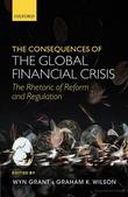Explore

The Consequences of the Global Financial Crisis
Wyn Grant and Graham K. Wilson
2012-2014
6 Ungluers have
Faved this Work
Login to Fave
The Global Financial Crisis (GFC) is the most serious economic crisis since the Great Depression. Many books have explored its causes, but this book systematically explores its consequences. The focus is primarily on the policy and political consequences of the GFC. This book asks how governments responded to the challenge and what the political consequences of the combination of the GFC itself and policy responses to it have been. Based on workshops held in the United States and the United Kingdom, it brings together leading academics to consider the divergent ways in which particular countries have responded in different ways to the crisis, including China, France, the United Kingdom, and the United States. Part of what is happening is a structural shift in economic power from east to west, but China has its fragilities while Germany offers an example of a largely successful Western model. The book also assesses attempts to develop global economic governance and to reform financial regulation and looks critically at the role of credit rating agencies. Unlike earlier crises, no new paradigm has emerged to challenge existing ways of thinking, meaning that neoliberalism has emerged relatively unscathed. The crisis has lacked a coherent and innovative intellectual response and has been characterized by remarkable policy stability.
This book is included in DOAB.
Why read this book? Have your say.
You must be logged in to comment.

